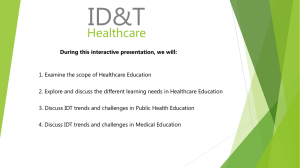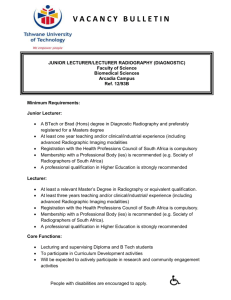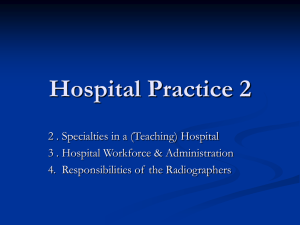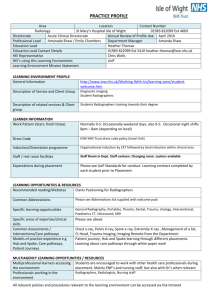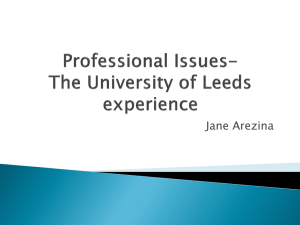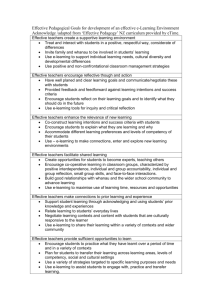e-Learning for Healthcare – Clinical Lead/Module Editor for Image
advertisement
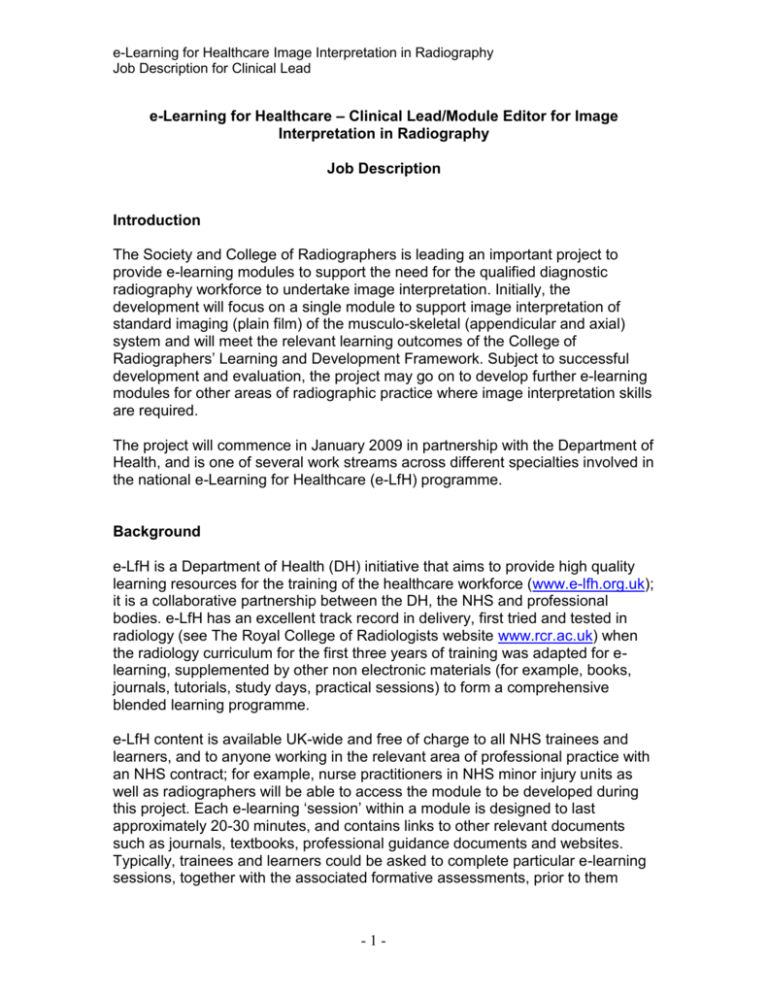
e-Learning for Healthcare Image Interpretation in Radiography Job Description for Clinical Lead e-Learning for Healthcare – Clinical Lead/Module Editor for Image Interpretation in Radiography Job Description Introduction The Society and College of Radiographers is leading an important project to provide e-learning modules to support the need for the qualified diagnostic radiography workforce to undertake image interpretation. Initially, the development will focus on a single module to support image interpretation of standard imaging (plain film) of the musculo-skeletal (appendicular and axial) system and will meet the relevant learning outcomes of the College of Radiographers’ Learning and Development Framework. Subject to successful development and evaluation, the project may go on to develop further e-learning modules for other areas of radiographic practice where image interpretation skills are required. The project will commence in January 2009 in partnership with the Department of Health, and is one of several work streams across different specialties involved in the national e-Learning for Healthcare (e-LfH) programme. Background e-LfH is a Department of Health (DH) initiative that aims to provide high quality learning resources for the training of the healthcare workforce (www.e-lfh.org.uk); it is a collaborative partnership between the DH, the NHS and professional bodies. e-LfH has an excellent track record in delivery, first tried and tested in radiology (see The Royal College of Radiologists website www.rcr.ac.uk) when the radiology curriculum for the first three years of training was adapted for elearning, supplemented by other non electronic materials (for example, books, journals, tutorials, study days, practical sessions) to form a comprehensive blended learning programme. e-LfH content is available UK-wide and free of charge to all NHS trainees and learners, and to anyone working in the relevant area of professional practice with an NHS contract; for example, nurse practitioners in NHS minor injury units as well as radiographers will be able to access the module to be developed during this project. Each e-learning ‘session’ within a module is designed to last approximately 20-30 minutes, and contains links to other relevant documents such as journals, textbooks, professional guidance documents and websites. Typically, trainees and learners could be asked to complete particular e-learning sessions, together with the associated formative assessments, prior to them -1- e-Learning for Healthcare Image Interpretation in Radiography Job Description for Clinical Lead beginning to provide image interpretations as part of their job role. The e-learning content will also be valuable as refresher training following practice audits; and undertaking sessions will assist individuals to meet their professional and statutory continuing professional development (CPD) requirements, as well as contributing to their CPD portfolios. This e-LfH project will provide e-learning materials to help meet the profession’s stated intent that all radiographers should be able to contribute effectively to image interpretation by 2010. The project will support radiographers’ image interpretation learning and skills development so that they can: Interpret the results of radiographic imaging examinations of the musculoskeletal (appendicular and axial) system, identifying accurately both normal examinations, and trauma and pathological conditions, including soft tissue conditions, Provide high quality reports on imaging examinations, communicating these appropriately to referring clinicians. The topic areas to be covered in the module are image interpretation of the radiographic examinations of: Appendicular Skeleton: Foot Ankle, and tibia and fibula Knee and Femur Hip joint, together with pelvis from the axial skeleton Hand and digits Wrist, and radius and ulna Elbow Shoulder girdle and humerus Axial Skeleton: Skull and facial skeleton Cervical spine Thoracic Spine and bony thoracic cage Lumbo-sacral spine At this stage, the module is limited to image interpretation of adult examinations. The e-learning module will provide the necessary image interpretation knowledge and skills training to help candidates prepare for their College of Radiographers approved postgraduate awards in image interpretation which is the normal prerequisite for a radiographer to become a reporting radiographer. The module will also provide effective learning support for those groups of staff who are expected to evaluate imaging examinations as part of their practice but for whom there is no national training programme; for example, nurse practitioners and physiotherapists. -2- e-Learning for Healthcare Image Interpretation in Radiography Job Description for Clinical Lead The project is funded centrally by the Department of Health. This includes standard backfill rates1 for the posts of Clinical Lead and Module Editors (it is normal for these post-holders to be seconded from their usual appointments). For this project, which is limited in scope to a single module initially, these posts are combined into a single post of Clinical Lead/Module Editor. A team of Content Authors will be recruited jointly by the Clinical Lead/Module Editor and the College of Radiographers to develop and assemble the materials for each of the topic areas listed above. e-LfH will provide instructional designers to work with the Content Authors to translate their materials into a format suitable for elearning, and e-LfH technical staff will develop this into e-content. Content Authors are not supported by backfill, but receive an honorarium for each completed session. Travel and other necessary expenses are funded through the project. Both the Clinical Lead/Module Editor and the Content Authors will need to comply with the e-LfH programme model. In relation to intellectual property rights, this requires intellectual property rights in the content to be assigned to SCOR, although this is on a non-exclusive basis. Role Description In partnership with the e-LfH team, the Clinical Lead/Module Editor’s key tasks will be to: (i) (ii) (iii) (iv) (v) Lead on the recruitment of a team of Content Authors to assemble the materials required for each of the topic areas identified for this musculo-skeletal image interpretation e-learning module, Agree the detailed scope of each of the topic areas with the appointed Content Author(s), Co-ordinate the work of the team of Content Authors, paying particular attention to consistency of work across the team, Review all completed work, subjecting this to a strict peer review process, and signing off the work when it is has been completed to the required standards, Prepare the module content into a form suitable for transfer into an e-learning format by the e-LfH project engineers. There will be an Executive Board for the project, chaired by the National Director of e-LfH, with representation from key stakeholders. Within the College of Radiographers, the Clinical Lead/Module Editor will be responsible to the project’s Clinical Champion, the Director of Professional Policy. The commitment will be for two full days each week for a period of one year, initially. The commitment will be negotiated with the individual’s main NHS or University employer, and incorporated within his/her weekly job plan timetable. 1 The standard backfill rate includes any overheads and on-costs. -3- e-Learning for Healthcare Image Interpretation in Radiography Job Description for Clinical Lead Much of the work can be undertaken remotely, but there will be a requirement to work at the College of Radiographers’ London offices on occasions. The Clinical Lead/Module Editor’s role will comprise: Providing the day to day leadership for the project in partnership with the e-LfH delivery manager Recruiting a team of content authors and agreeing the topics they will each be responsible for Ensuring that existing educational material (including that already available through eLfH) is adapted, enhanced and integrated into the project where appropriate Exercising leadership to secure the development of the necessary intellectual material by the team of content authors Setting and maintaining a challenging timescale Analyzing and advising how the module could be used by various groups, for example: o radiographers o nursing and other allied health professional staff o doctors in training o education providers o employers (for example, to assist them to be confident about the competence of their staff) To keep the Clinical Champion and relevant committees appraised of the project’s progress -4- e-Learning for Healthcare Image Interpretation in Radiography Job Description for Clinical Lead Person Specification Attribute 1. Qualifications and Academic Achievements 2. Experience and Skills 3. Special Aptitudes and Abilities Essential Diagnostic radiography qualification Registered with the Health Professions Council Member in good standing of the Society of Radiographers Evidence of previous involvement in developing and/or delivering healthcare professionals’ education and educational materials (at pre- or postgraduate level) An interest in e-learning Practising in radiography in a clinical and/or educational role Effective interpersonal skills Ability to establish and lead educational teams Tenacity to drive and deliver a project to exacting timescales -5- Desirable Higher degree Teaching or IT qualification Relevant distinctions, prizes, research awards, scholarships Involvement in educational programmes approved by the College of Radiographers Experience in developing and/or delivering postgraduate reporting programmes for radiographers Experience with distance, workbased or blended learning educational activities Experience of strategic planning Ability to motivate others Understanding of IT in relation to postgraduate education e-Learning for Healthcare Image Interpretation in Radiography Job Description for Clinical Lead 4. Personal Attributes Evidence of commitment to continuing professional development Energy and ability to think creatively 5. Other requirements Availability to attend relevant committee meetings Evidence of ability to produce progress reports Evidence of ability to work to deadlines Awareness of issues impacting on postgraduate and continuing education for radiographers and other healthcare professionals Awareness and experience of using the College of Radiographers Learning and Development Framework Skill in time management Intending applicants are asked to note the following: Closing date for applications 8th December 2008 (by12 noon) Notification to those short-listed 11th December 2008 Interviews (at the College of Radiographers offices) 17th December 2008 Applications to be made by email only to Audrey M Paterson, Director of Professional Policy, The Society and College of Radiographers (audreyp@sor.org). Those wishing to discuss the post informally prior to application are welcome to make an appointment through Karen Wellings, Assistant Executive Secretary (karenw@sor.org) To discuss e-LfH further, applicants are also welcome to contact Dr Julia Moore, e-LfH National Director (Julia.Moore@dh.gsi.gov.uk), or Alan Ryan, e-LfH National Programme Director (alan.ryan@e-lfh.org.uk). -6-

